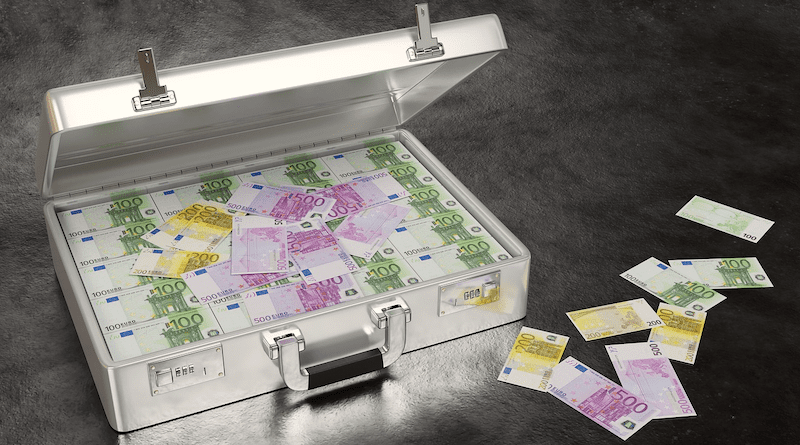Russian Money Flowing Illicitly Through Western Balkans
New report from Global Initiative Against Transnational Organised Crime says the Western Balkans has become a key gateway for Russian cash to flow illicitly across borders thanks to the weak rule of law and high presence of orgnised crime there.
By Xhorxhina Bami
A new report by the Global Initiative Against Transnational Organized Crime, GI-TOC, published on Monday, warns that weak rule of law, organised crime and a large “grey” economy in Western Balkan countries – and the war in Ukraine – have allowed Russian Illicit Financial Flows, IFFs, to surge through the region and interfere in key decision making processes there.
“The Balkans’ strategic geographic position, acting as a gateway between Asia and Western Europe, coupled with an ecosystem of state capture, institutional weaknesses, organised crime and a rampant shadow economy, make the region particularly susceptible to IFFs,” Vanya Petrova, author of the report, told BIRN.
“This fact has actively been exploited by major players such as Russia, China and the UAE to influence decision-making in key markets and institutions,” she added.
The Kremlin has repeatedly taken advantage of its integration into the Western financial system to exploit governance gaps through the corrosive effect of illicit finance. This danger has taken on new and potentially greater dimensions with the onset of Russia’s war in Ukraine,” she says.
Global IFFs are estimated to be worth around 1-1.6 trillion US dollars annually, accounting for 3-5 per cent of world gross domestic product, GDP. However, according to Petrova, in the Western Balkans the figure is around 6 per cent of the region’s GDP.
After Russia invaded Ukraine in February last year, many sanctions were introduced, including a freeze by G7 countries of around 315 billion US dollars’ worth of Russian reserves held in Russia’s Central Bank.
Ways used by Russian elites to avoid sanctions include “laundering money through the purchase of real estate and business assets; utilizing professionals to open bank accounts, initiate bank transactions, transfer funds and create corporate structures that directly or indirectly support them; using complex ownership structures to avoid identification; and using third-party jurisdictions and false trade information to facilitate sensitive goods shipments to Russia”.
Russians avoid sanctions via the Western Balkans “with their combination of state and media capture, simmering ethnic divisions, slow pace of EU accession and the legacy of Russian cognitive bias”.
According to the report, since 2014, Bosnia, Bulgaria and Serbia have not followed EU sanctions against Russia, while both North Macedonia and Montenegro have provided so-called citizenship for investment to Russian citizens, despite criticism from the EU.
Albania has not yet followed through with a “fiscal amnesty” programme that would allow any Albanian or foreign citizen to deposit up to €2 million in non-declared money in the banking system, but has not scrapped the idea either.
Smuggling of people, weapons and cash have facilitated illegal activity since the start of the war in Ukraine. Smuggled cash is mainly concealed in cars or hidden among legitimate products in transport trucks or shipping containers.
According to the report, soon after the war started in 2022, Ukrainian refugees took undeclared cash with them to Europe; the wife of a former Ukrainian MP was caught at a border crossing for refugees with US$28 million and €1.3 million as she tried to enter Hungary.
In another case, a former Ukraine security service general, allegedly a Russian collaborator, was detained at the Serbia-North Macedonia border with €600 000 in cash, a large sum in US dollars, and diamonds and emeralds of unknown value.
Intensified use of covert channels for illegal money transfers into Albania exists as well.
Flows are often made indistinguishable by being mixed with gains in “cash-intensive businesses, such as restaurants, bars, beauty salons, petrol stations, private parking lots and taxi companies,” where this illegal money is laundered.
The report also explains that another form of IFF is fuel fraud. This often includes the evasion of custom tariffs by declaring lesses quantities of an oil product by selling fuel from ships on the Danube to fishers. A more recent trend, the report says, is the purchase of fuel at lower prices from Hungary and reselling it in Serbia.
The EU single market has a zero VAT policy for invoices between intermediaries, which has allowed VAT fraud to bloom. Petrova says that “in December 2022, the European Public Prosecutor’s Office (EPPO) uncovered what is believed to be the biggest VAT carousel fraud ever investigated in the EU, responsible for an estimated loss to EU taxpayers of €2.2 billion, including Bulgaria and Croatia, as well as third countries such as Albania and Serbia”.
“In general, this and trade misinvoicing remains the most prominent channel through which IFFs flow in and out of the Western Balkans,” Petrova writes. Trade misinvoicing includes fake legal transactions when no real business is taking place.
The report urges Europe to further decouple its economy from Russia, a network screening and sanctioning of Russian strategic investments in the Balkans, and to “prioritize the integration of the Balkans into the rollout of the newly designed Anti-Money Laundering Authority (AMLA) and coordinating their actions with US FinCEN and the financial intelligence institutions in each EU member state”.

